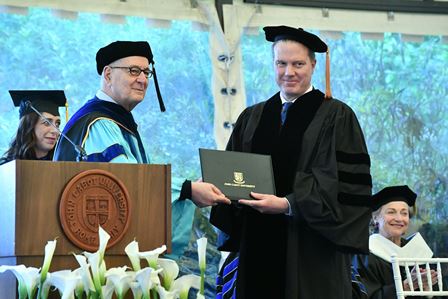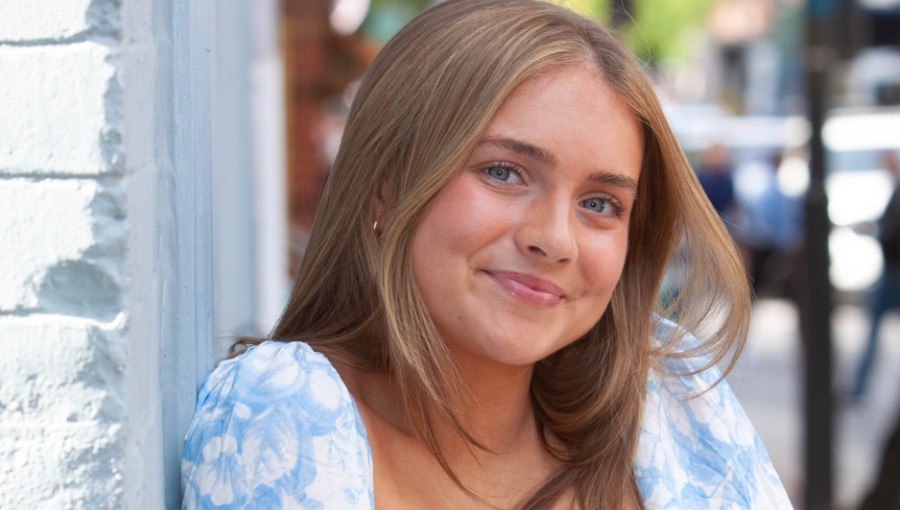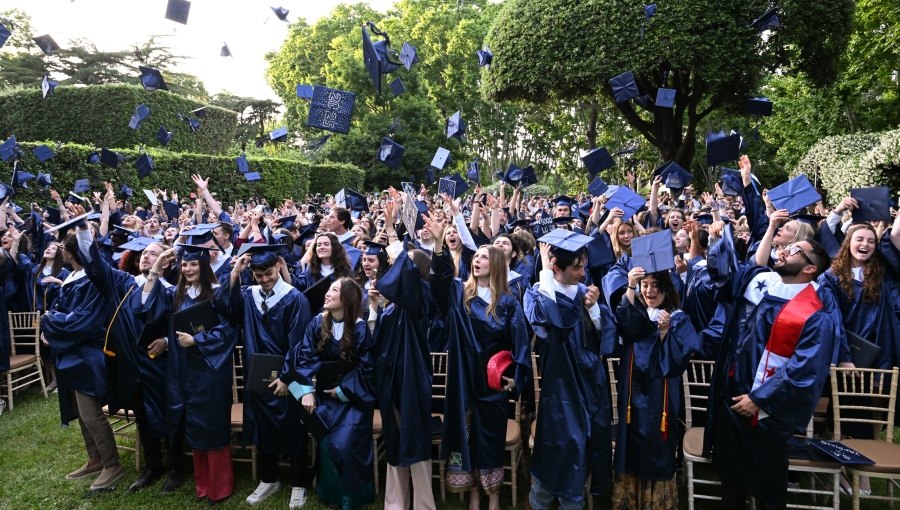Congratulations to John Cabot University Class of 2019!
“Greatness is striving to achieve a more peaceful and egalitarian society by whatever means you have at hand. And it doesn’t matter if you make this world better in a brief moment and immediately or slowly and consistently over your whole lifetime. You can only be meaningful and useful if you strive to be true to yourself, true to your own pace.” – Class of 2019 Valedictorian Tamara Volozhanina
The Class of 2019
John Cabot University celebrated the Class of 2019 at the 47th Commencement ceremony on May 20, held at Villa Aurelia on the Janiculum Hill overlooking the city of Rome. 208 students received their B.A. degrees and 7 students received their M.A., the first graduating class of JCU’s Master of Arts in Art History.
The invocation was given by Fr. Riccardo Lufrani, O.P., Prior of the Santa Maria Sopra Minerva convent, Chaplain of John Cabot University.
Message from Giuseppe Conte, President of the Council of Ministers of the Republic of Italy
President Conte, who had been invited to give the Commencement Address to the Class of 2019, was unable to participate in the ceremony due to unforeseen institutional commitments. He sent the graduates a message of congratulations, which was read by President Pavoncello.
“I would like to take this opportunity to congratulate you for the important accomplishment you have achieved, the first of a long series of successes that will mark your professional and personal life. You have been privileged to attend such an excellent university in one of the most fascinating cities in the world. Each day of your educational path has been enriched by the beauty, history, and incredible cultural heritage of both Rome and Italy as a whole. I hope that you will make good use of this significant experience in facing your upcoming challenges. In particular, I wish for the non-Italian students to become ‘Ambassadors’ of our beautiful country, which has hosted you in these years, and that, I am sure, has become your second home.”
President Franco Pavoncello’s Greetings
JCU President Franco Pavoncello congratulated the members of the Class of 2019, whose members come from 31 countries. “As you have blossomed and changed over the past few years, the university has also seen a profound transformation. JCU has reached an enrollment of 1,500 students, greatly expanded its facilities, been granted reaccreditation by the Middle States Association, and launched its first graduate degree, the M.A. in Art History, which in just two years has become extremely successful, and whose first graduates we are proud to celebrate here today.”
The President then talked about the changes taking place in the world around us, changes that will only accelerate in the future. “How can we deal with these changes and empower our future generations to deal with them?” asked President Pavoncello. “We need centers of higher of education that are at the forefront of academic excellence, centers of leadership and community, where intellectual inspiration is constant, where the classroom is a living body of multicultural, multifaceted experiences, which can serve as an immediate sounding board for our ideas.”
“Most of all,” explained President Pavoncello, “to form the next generations of dedicated leaders, of which you are certainly part, we need a love for dialogue, true dialogue, dialogue with those who do not share our opinions, who force us to listen and discuss, and at the same time we need a passion for free objective inquiry, for evidence and truth. I believe that John Cabot University, because of its community, its location, its dedication, and its past, provides such an environment. And you are the proof that this is so. You will show the shining success of this institution by spreading out to the finest graduate schools of the world, and the leading companies and organizations.”
The President then introduced Sal Salibello, Chairman of the JCU Board of Trustees, who congratulated the graduates on behalf of the Board.
Honorary Degree to Greg Burke
President Pavoncello then proceeded to award the degree of Doctor of Humane Letters, honoris causa, to journalist Greg Burke. A graduate of the Columbia University School of Journalism, Burke was the Rome correspondent for Time magazine from 1994 to 2001, before covering Europe and the Middle East for Fox News from 2001 to 2012. In 2012, he became Senior Communications Advisor for the Vatican Secretary of State, and in 2016, he became Spokesperson for Pope Francis – Director of the Holy See Press Office, a position he held until 2018.
In presenting the honorary degree, President Pavoncello described Burke as “a distinguished professional journalist who has mastered both the gathering of information and the production of information itself brilliantly and with integrity, while maintaining a strong ethical spirit and setting an excellent standard of professionalism in the field.”
In thanking John Cabot University for this honor, Burke encouraged the Class of 2019 to think hard about what they want to last in their lives, their professions, and their relationships and friendships. He recalled working for Pope Francis, who gets an enormous number of requests for selfies and he agrees to them although it’s not his style. “The Holy Father,” says Burke, “would much rather spend those few moments looking in your eye, listening to you, hearing what your deepest needs are, perhaps giving you a big hug.”
According to Burke, there is an important lesson in the Pope’s attitude: “Take all the selfies you want today and enjoy your time in the limelight, then start thinking about how to shift from self toward service, to shift from self towards sharing with others, all the talents you’ve received these years in Rome. Thank you and congratulations!”
Conferring of Presidential Medal to Dr. Eric Nummela
Dr. Eric Nummela was Vice-President and Dean of JCU from 1989 to 1993. He holds a Ph.D. in mathematics from Tulane University, and prior to coming to John Cabot, was a full professor of mathematics at New England College before becoming Dean of its School of Engineering. When he arrived in Rome at John Cabot International College, as JCU was known then, there were five staff members in a small villa with three classrooms.
“Eric, a professional of unsurpassed knowledge and understanding of academic organization and rules, made many contributions to JCU,” said President Pavoncello. During his tenure at John Cabot, the college adopted its first ever set of Faculty Bylaws, became John Cabot University, and moved into the far more spacious and prestigious location of the Guarini Campus, a place that has become its historic home.
President Pavoncello then presented to Dr. Nummela the John Cabot University Presidential Medal in light of his outstanding, lasting contribution to the strengthening and success of John Cabot University, at a pivotal moment of its history.
In accepting the medal, Dr. Nummela recalled that when he arrived at John Cabot almost 30 years ago, there were about 150 students and 12 full-time faculty members. “The odds against the viability of such a small institution were enormous. However, the dedication of every member of that community and the love and respect that they had for one another enabled it to grow and prosper. By September 1993, the viability of the university, while still uncertain, had greatly improved. I want to assure you that I was not the cause agent; rather I was a sort of catalyst that allowed the latent potential of the university, the creativity, and the enthusiasm of everyone in the university community to blossom and flourish. I have followed the progress of the university and have rejoiced at its growth almost beyond my recognition into the outstanding institution that it is today. The years may come and the years may go, but my memories of John Cabot University will always shine in my heart.”
See more Commencement 2019 photos on the JCU Facebook Page
Valedictorian
President Pavoncello then introduced the Class of 2019 valedictorian Tamara Volozhanina, B.A. in International Affairs, minor in Communications, summa cum laude, with a grade point average of 3.95. Born in Russia, Tamara is going to pursue a Master’s program in Global Governance and Diplomacy at the University of Oxford.
In her valedictory address, Tamara thanked JCU’s amazing faculty members: “If it had not been for your outstanding erudition and shining enthusiasm for teaching, we would never have become the aspiring young professionals that we are today. Thank you for believing in us so sincerely that we have learned to believe in ourselves.”
She then urged fellow graduates to find their own pace in life: “Fear not to choose your own pace and be prepared that it might be slightly, significantly, or even tremendously different from the paces of people around you. You are one of a kind and so is your pace. Accept and respect your deep essence. Tamara ended by quoting Michelle Obama, who once said that you don’t have to be somebody different to be important, you are important in your own right. “ I cannot agree more, said Tamara. ‘You-ness’ is greatness and you, every single one of you can be and will be great.”
Dean Mary Merva Confers Degrees
Vice President and Dean of Academic Affairs Mary Merva presented diplomas to graduates, who received their Master of Arts degrees in Art History and Bachelor of Arts degrees in Art History, Business Administration, Classical Studies, Communications, Economics and Finance, English Literature, History, Humanistic Studies, International Affairs, International Business, Italian Studies, Marketing, and Political Science.









